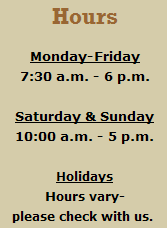
The relationship that we form with animals is unique. The loss of an animal can have an impact on you that are as great as or even greater than the loss of a family member or friend. This bond is what makes our relations with animals rich and pleasing, but also what makes the grief process so difficult.
After your animal has died or been lost, it is natural and normal to feel grief and sadness. Although grief is an internal and private reaction, there are certain stages of grief that nearly everyone experience. By accepting the process, you will be better prepared to manage your pain and to help other family members who share your sense of loss.
There are many stages of grief, but not everyone experiences them all or in the same order. You may experience rejection, rage, guilt, despair, acceptance, and resolution.
- Your first reaction may be denial that the animal has died or that death is coming up. Denial may begin when you first learn the seriousness of your animal's illness or injuries. Frequently, the more abrupt the death, the more difficult the loss is to accept.
- Anger and guilt often follow denial. Your anger may be aimed at people you usually love and respect, including your family and your veterinarian. People coping with death will often say things that they do not really mean, maybe hurting those whom they do not mean to hurt. You may feel guilty for not doing something sooner, for not being able to afford other types of or further treatment, or for being careless and allowing the animal to be injured.
- Depression is also part of the variety of emotions experienced after the death of a special animal. The tears pour, there are knots in your stomach, and you feel weak of all your energy. Day-to-day tasks can seem impossible to achieve. Sometimes you may even ask yourself if you can go on without the animal. The answer is yes, but there are times when special assistance may be helpful in dealing with your loss.
- Ultimately, you will come to terms with your feelings. You can begin to resolve and accept your animal's death. Even when you have reached resolution and acceptance, feelings of anger, denial, guilt, and depression may reappear. If this does happen, these feelings will usually be less intense, and with time will be replaced with loving memories.
Although the stages of grief apply fairly universally, grieving is always a personal process. Some people take longer than others to come to terms with denial, anger, guilt, and depression, and each loss is different. If you understand that these are normal reactions, you will be better prepared to cope with your feelings and to help others face theirs. Family and friends should be reassured that sorrow and grief are normal and natural responses to death.
Sometimes family and friends may not realize how important your animal was to you or the intensity of your grief. Comments they make may seem nasty and insensible. Be sincere with yourself and others about how you feel. If hopelessness mounts, talk to someone who will listen to your feelings about the loss of your animal. Talk about your sorrow, but also about the fun times you and the animal spent together, the activities you enjoyed, and the memories that are meaningful.
If you or a family member have great difficulty in accepting your animal's death and cannot resolve feelings of grief and sorrow, you may want to discuss these feelings with a person who is trained to understand the grieving process. Your veterinarian certainly understands the relationship you have lost and may be able to suggest support groups and hot lines, grief counselors, clergymen, social workers, physicians, or psychologists who can help.
The death of an animal can upset you emotionally, especially when euthanasia is involved. Some people may feel they would never want another animal. For others, a new animal may help them recover from their loss more quickly. Just as grief is a personal experience, the decision of when, if ever, to bring a new animal into your life is a personal one. If a family member is having difficulty accepting the animal's death, getting a new animal before that person has resolved his or her grief may imply that the life of the deceased animal was unworthy of the grief that is still being felt. Family members should agree on the suitable time to get a new animal. Although you can never replace the animal you lost, you can obtain another to share your life.
The time from birth to old age is much shorter for most domestic animals than for people. Death is part of the lifecycle. It cannot be avoided, but understanding and compassion can help you, your family, and your friends manage the grief associated with it. Try to remember and treasure the good times you spent with your animal. You may also wish to establish a memorial of some type or contribute to a charity in honor of your animal.
In memory of Blitz and Hanni Glass
We love you Diana and Steven

































0 comments:
Post a Comment